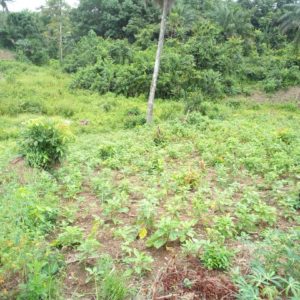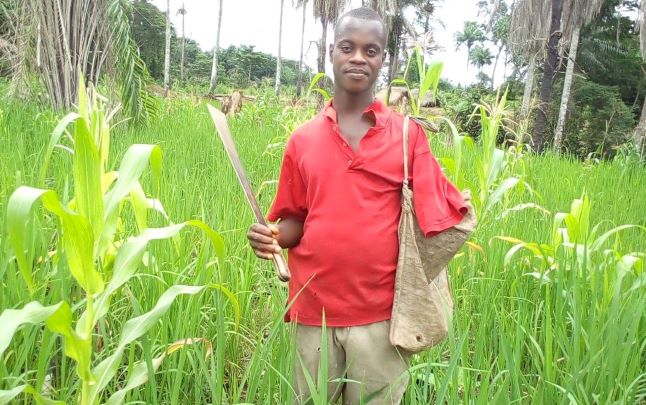PHOTO: Togbah Flomo, with only right arm active, on his farm
By J. Peter S. Dennis, dennisrealone@gmail.com
+231888958945/+231770177125
A physically challenged Liberian farmer living in Bong County, central Liberia says agriculture is the best alternative for emancipation from poverty for people living with disabilities in Liberia, despite the continuous challenges.
Thirty-eight-year-old Togbah Flomo has been involved in agriculture for 20 years as a source of livelihood and is calling on fellow Liberians to get involved in the sector as this is a sure means of overcoming poverty.
A father of three – two boys and a girl- lives in the Rubber Factory Community in Gbarnga.
Gbarnga has a total population of 45,835 inhabitants (August 2021), according to Worldometer, while the 2008 National Housing and Population census put the population of Bong County at 328,919 people, including children and adults.
This physically challenged man, who lost his left arm during the brutal Liberian civil-war, says he has mustered the courage to make a difference through agriculture because “people living with disabilities are usually considered as lazy people and beggars in Liberia; a perception he strongly considers as discriminatory against PwDs.

Some of his crops sprouting
Flomo told this Reporter that his three children are in school, maintaining that their school fees are being paid regularly through the proceeds he gets from his farm.
Beaming with smiles throughout the interview, this physically challenged local farmer was full of praises for his kids as he boasted over their outstanding academic performances.
According to him, he didn’t enjoy a taste of education due to his parents’ unfortunate financial situation. He however expressed determination to acquire some education one day, although he did not mention how and through what means; he didn’t seem to be bothered about aging.
Togbah Flomo is currently planting mixed vegetables- corn (maize), bitter-balls, and okra on his farm. He has already planted sweet potatoes, eddoes and yams on an approximately two (2) acres of rented land.These mixed vegetables are widely consumed in Liberia.
With continuous help from the Almighty God, Togbah says, he has been able to provide the basic needs of his family based on the results from his farm produce.
Currently, he has two acres of farmland on which he has planted rice, the nation’s staple. According to him, his fiancée (Norah Kollie) and children are his backups in these projects.
“My children and my spouse normally help me in these works. When my children come from school, they come over to the farm to help us.They have gotten used to it, and are happy,” he said during the interview.
Mr. Flomo’s farm is situated within theRubber Factory Community, about twenty five (25) minutes walk away from his house.
This courageous man is badly in need of financial and material support, including hoes, cutlasses, pesticide, land, these he says are major challenges confronting him, as he plans to venture into commercial farming in the future.
These farming implements (tools) and up-to-date pesticides cited by Mr. Flomo have posed a major challenge for Liberian smallholder farmers. The Liberian government has over the years made some efforts to addresskle the situation but has only been able to succeed on a minimum scale. Most local farmers usually purchase these farming equipments from private street vendors at very high cost.
Flomo further disclosed that he has commenced saving of funds to construct his private home, as he is currently in a rented house. He told this Internews PwD fellow that he bought his land three (3) years ago and has been maintaining it. He hopes to commence his building project before the end of 2022.
He is currently in the process of procuring the necessary building materials little by little based on his current financial strength. “You need to think and use your intelligence for survival,” he says.
According to UN statistics, there are currently over 600 million persons with disabilities throughout the world of whom 400 million live in developing countries and 80 million in Africa.
A World Health Organization source maintains that about forty percent of Africa’s population consists of people with disabilities, including 10 -15 percent of school-age children. This percentage would translate into about 300 million people with disabilities in Africa.
Disability is caused by many factors, including malnutrition and disease, environmental hazards, traffic and industrial accidents, and civil conflict and war, and the number of people with disabilities continues to increase.
The vast majority of Africans with disabilities are usually excluded from schools and opportunities for work, virtually guaranteeing that they live as the poorest of the poor. School enrolment for the disabled is estimated at no more than 5 – 10 percent and as many as 70 – 80 percent of working-age people with disabilities are unemployed.
The social stigma associated with disability results in marginalization and isolation, often leading to begging as the sole means of survival for many PwDs. This Report was made possible with support from Internews Liberia Inclusive Media Project.

